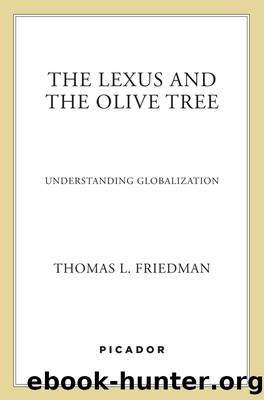The Lexus and the Olive Tree by Thomas L. Friedman

Author:Thomas L. Friedman
Language: eng
Format: epub
Publisher: Farrar, Straus and Giroux
12
The Golden Arches Theory of Conflict Prevention
Every once in a while when I am traveling abroad, I need to indulge in a burger and a bag of McDonaldâs french fries. For all I know, I have eaten McDonaldâs burgers and fries in more countries in the world than anyone, and I can testify that they all really do taste the same. But as I Quarter-Poundered my way around the world in recent years, I began to notice something intriguing. I donât know when the insight struck me. It was a bolt out of the blue that must have hit somewhere between the McDonaldâs in Tiananmen Square in Beijing, the McDonaldâs in Tahrir Square in Cairo and the McDonaldâs off Zion Square in Jerusalem. And it was this:
No two countries that both had McDonaldâs had fought a war against each other since each got its McDonaldâs.
Iâm not kidding. It was uncanny. Look at the Middle East: Israel had a kosher McDonaldâs, Saudi Arabia had McDonaldâs, which closed five times a day for Muslim prayer, Egypt had McDonaldâs and both Lebanon and Jordan had become McDonaldâs countries. None of them have had a war since the Golden Arches went in. Where is the big threat of war in the Middle East today? Israel-Syria, Israel-Iran and Israel-Iraq. Which three Middle East countries donât have McDonaldâs? Syria, Iran and Iraq.
I was intrigued enough by my own thesis to call McDonaldâs headquarters in Oak Brook, Illinois, and report it to them. They were intrigued enough by it to invite me to test it out on some of their international executives at Hamburger University, McDonaldâs in-house research and training facility. The McDonaldâs folks ran my model past all their international experts and confirmed that they, too, couldnât find an exception. I feared the exception would be the Falklands war, but Argentina didnât get its first McDonaldâs until 1986, four years after that war with Great Britain. (Civil wars and border skirmishes donât count: McDonaldâs in Moscow, El Salvador and Nicaragua served burgers to both sides in their respective civil wars.)
Armed with this data, I offered up âThe Golden Arches Theory of Conflict Prevention,â which stipulated that when a country reached the level of economic development where it had a middle class big enough to support a McDonaldâs network, it became a McDonaldâs country. And people in McDonaldâs countries didnât like to fight wars anymore, they preferred to wait in line for burgers.
Others have made similar observations during previous long periods of peace and commerceâusing somewhat more conventional metaphors. The French philosopher Montesquieu wrote in the eighteenth century that international trade had created an international âGrand Republic,â which was uniting all merchants and trading nations across boundaries, which would surely lock in a more peaceful world. In The Spirit of the Laws he wrote that âtwo nations who traffic with each other become reciprocally dependent; for if one has an interest in buying, the other has an interest in selling; and thus their union is founded on their mutual necessities.
Download
This site does not store any files on its server. We only index and link to content provided by other sites. Please contact the content providers to delete copyright contents if any and email us, we'll remove relevant links or contents immediately.
| Accounting | Economics |
| Exports & Imports | Foreign Exchange |
| Global Marketing | Globalization |
| Islamic Banking & Finance |
The Meaning of the Library by unknow(2558)
Six Billion Shoppers by Porter Erisman(2290)
Why Nations Fail: The Origins of Power, Prosperity, and Poverty by Daron Acemoglu & James Robinson(2276)
No Time to Say Goodbye(2108)
Red Notice by Bill Browder(2068)
Currency Trading For Dummies by Brian Dolan(1917)
The Economist [T6, 22 Thg9 2017] by The Economist(1914)
Thank You for Being Late by Thomas L. Friedman(1762)
Bitcoin: The Ultimate Guide to the World of Bitcoin, Bitcoin Mining, Bitcoin Investing, Blockchain Technology, Cryptocurrency (2nd Edition) by Ikuya Takashima(1688)
Amazon FBA: Amazon FBA Blackbook: Everything You Need To Know to Start Your Amazon Business Empire (Amazon Empire, FBA Mastery) by John Fisher(1558)
Coffee: From Bean to Barista by Robert W. Thurston(1521)
The Future Is Asian by Parag Khanna(1473)
The Great Economists by Linda Yueh(1447)
How Money Got Free: Bitcoin and the Fight for the Future of Finance by Brian Patrick Eha(1417)
Grave New World by Stephen D. King(1414)
Pocket World in Figures 2018 by The Economist(1406)
Capitalism Without Capital: The Rise of the Intangible Economy by Jonathan Haskel(1389)
The Sex Business by Economist(1374)
Cultural Intelligence by David C. Thomas(1285)
